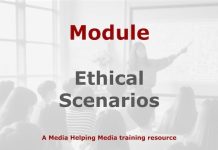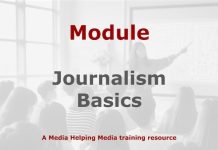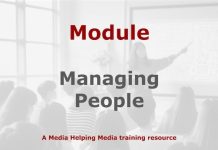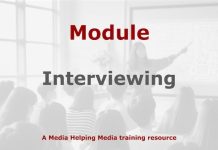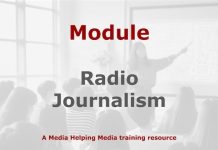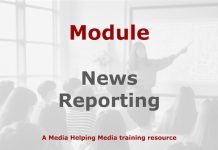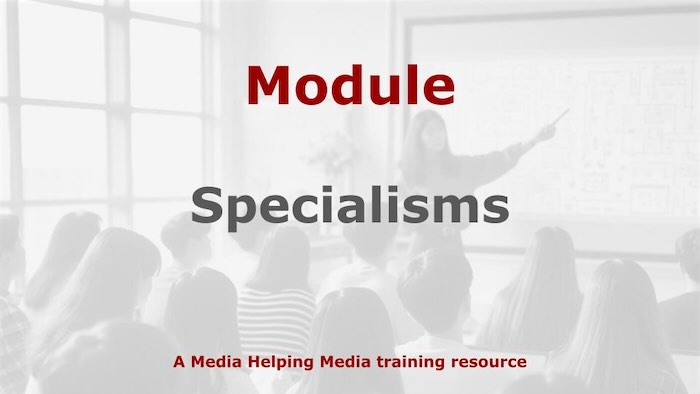 This module aims to equip aspiring and current journalists with the knowledge and skills necessary to cultivate a specialist area of coverage, establish themselves as experts, and report with depth, accuracy, and independence.
This module aims to equip aspiring and current journalists with the knowledge and skills necessary to cultivate a specialist area of coverage, establish themselves as experts, and report with depth, accuracy, and independence.
The six-week module is designed to be adapted by universities and colleges to meet local needs. It focuses on the practicalities of identifying a niche, mastering subject matter, navigating complex reporting environments, and maintaining ethical standards.
Module timetable
Week 1: Laying the foundation for specialisms
- Introduction to specialisms:
- Resource: Specialisms in journalism
- Focus: This resource highlights the advantages of specialisation, such as becoming an expert, building a strong reputation, and generating unique stories. It also touches on the challenges, like the need for continuous learning and avoiding narrow perspectives.
- Expansion: We will explore how specialisation allows journalists to go beyond surface-level reporting, offering more insightful and credible content. Discussion will centre on identifying potential specialist areas based on personal interest, existing knowledge, and market demand. Participants will begin brainstorming their own potential specialisms.
- Identifying and developing news sources:
- Resource: News sources and the ‘so what’ factor
- Focus: This article stresses the importance of diverse and credible news sources, and how to evaluate their reliability. Crucially, it introduces the ‘so what’ factor – ensuring that information has genuine significance and relevance to the audience.
- Expansion: We will discuss how to cultivate a wide range of sources, including official bodies, academics, NGOs, grassroots organisations, and individuals with lived experience. Emphasis will be placed on verifying information and understanding potential biases. The ‘so what’ factor will be applied to potential story ideas within chosen specialisms, ensuring impact and audience engagement.
Week 2: Core reporting skills for specific beats
- Understanding the legal Landscape: Court reporting basics:
- Resource: Court reporting for beginners
- Focus: This guide offers practical advice on navigating courtrooms, understanding legal terminology, and adhering to reporting restrictions. It covers the importance of accuracy and impartiality in covering legal proceedings. It is important that lecturers using this material adapt it for local circumstances.
- Expansion: Participants will learn about court etiquette, identifying key information in legal documents, and distinguishing between facts presented in court and unproven allegations. We’ll discuss the ethical considerations of reporting on sensitive cases and the impact of legal outcomes on individuals and society.
- Reporting on crime effectively:
- Resource: Crime reporting for beginners
- Focus: This resource provides guidance on reporting crime sensitively and accurately, focusing on avoiding sensationalism and respecting victims. It also highlights the importance of understanding police procedures and the criminal justice system. It is important that lecturers using this material adapt it for local circumstances.
- Expansion: The session will cover responsible language when reporting on crime, the need to avoid victim-blaming, and the importance of verification. We will also touch upon the relationship between journalists and law enforcement, and how to maintain independence while seeking information.
- Covering climate change
- Resource: Covering climate change
- Focus: This resource provides guidance on reporting on climate change with accuracy, avoiding false balance, and understanding the scientific consensus. It stresses the need for nuance, context, and linking local impacts to global issues.
- Expansion: We will delve into the complexities of climate science, policy, and solutions. Discussion will cover how to identify reliable sources, present data effectively, and report on the human impact of climate change without resorting to alarmism or denial. Emphasis will be placed on proactive storytelling and exploring diverse angles.
Week 3: Navigating powerful institutions
- Reporting on parliament and politics:
- Resource: Parliamentary reporting for beginners
- Focus: This article demystifies parliamentary procedures, explains how to follow legislative processes, and offers tips for identifying newsworthy stories from debates and committees. It is important that lecturers using this material adapt it for local circumstances.
- Expansion: Participants will learn about the structure of Parliament (or their relevant legislative body), the role of various committees, and how to access public records and reports. We will discuss strategies for translating complex legislative processes into clear, understandable news stories for the public.
- The relationship between journalists and politicians:
- Resource: Journalists and politicians
- Focus: This piece explores the often complex and sometimes adversarial relationship between journalists and politicians, highlighting the need for independence while acknowledging mutual reliance.
- Expansion: We will delve into the power dynamics at play, the importance of maintaining critical distance, and how to avoid being used for political agendas. Discussion will include the role of press conferences, briefings, and off-the-record conversations.
Week 4: The art of the interview and ethical practice
- Mastering the interview:
- Resource: Lesson: Preparing for and carrying out an interview
- Focus: This lesson emphasises thorough preparation, including research, developing key questions, and anticipating responses. It also covers practical aspects of conducting the interview itself.
- Expansion: Practical exercises will focus on structuring interviews, active listening, asking follow-up questions, and managing challenging interviewees. We will also discuss different interview formats (in-person, phone, written) and their respective advantages and disadvantages.
- Interviewing politicians effectively:
- Resource: Interviewing politicians
- Resource: Lesson: How to interview politicians
- Focus: These resources offer specific strategies for interviewing political figures, including how to ask tough questions, handle evasive answers, and prepare for potential spin.
- Expansion: Role-playing exercises will simulate challenging political interviews, allowing participants to practice techniques for holding politicians accountable, extracting concrete information, and cutting through rhetoric.
- Understanding interviewee motivation:
- Resource: Lesson: Understanding interviewees
- Focus: This lesson explores the various motivations interviewees may have for speaking to the media, from seeking publicity to wanting to expose wrongdoing. Understanding these motivations can help journalists tailor their approach.
- Expansion: We will discuss how to build rapport, identify potential hidden agendas, and critically evaluate the information provided by interviewees based on their motivations. This is crucial for maintaining journalistic independence and accuracy.
Week 5: Navigating sensitive and challenging coverage
- Reporting from conflict zones and traumatic situations:
- Resource: Reporting from conflict zones
- Focus: This guide provides essential safety advice and ethical considerations for journalists operating in dangerous environments or covering sensitive topics like abuse. It stresses the importance of trauma awareness and responsible reporting.
- Expansion: While not all specialisms involve direct conflict zones, the principles of safety, trauma-informed reporting, and protecting vulnerable individuals are universally applicable. We will discuss strategies for mitigating risk, securing data, and providing support for both journalists and those they report on. Ethical dilemmas in covering abuse will be a key discussion point.
- Avoiding manipulation in journalism:
- Resource: Avoiding manipulation
- Focus: This article provides insights into how journalists can be manipulated by various actors (governments, corporations, individuals) and offers strategies for identifying and resisting such attempts.
- Expansion: We will explore common manipulation tactics, including propaganda, misinformation, emotional appeals, and the strategic leaking of information. Case studies will be used to analyse real-world examples, and participants will develop critical thinking skills to identify and counter manipulative efforts.
Week 6: Elections, independence, and investigative depth
- Editorial independence during elections:
- Resource: Editorial independence during elections
- Focus: This resource highlights the paramount importance of maintaining impartiality and independence during election coverage, avoiding bias, and ensuring fair representation of all parties and candidates.
- Expansion: Discussion will focus on the pressures journalists face during election periods, how to ensure balanced reporting, and the ethical responsibilities of media organisations. We will cover the risks of ‘pack journalism’ and the importance of independent analysis.
- Investigating election irregularities:
- Resource: Investigating election irregularities
- Focus: This guide equips journalists with tools to identify and investigate potential electoral malpractice, from voter registration issues to ballot counting anomalies.
- Expansion: This session will delve into practical investigative techniques, including data analysis, document scrutiny, and interviewing eyewitnesses in the context of elections. It will reinforce the role of specialist journalists in holding democratic processes accountable and ensuring transparency.
- Module wrap-up and future steps:
- Activity: Participants will present a refined concept for their chosen specialist area, outlining potential story ideas, key sources, and a plan for ongoing development.
- Discussion: Review of module learnings, challenges, and opportunities for continuous professional development as a specialist journalist. Emphasis on building a portfolio and networking within their chosen field.
